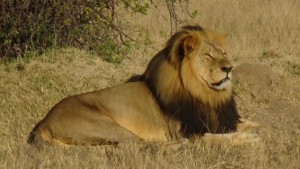July 30:
“Not to hurt any living thing is no doubt a part of ahimsa. But it is its least expression.”
–Gandhi (From Yeravda Mandir)
 The killing of a beloved 13-year-old, protected African lion, known as Cecil, has prompted an outpouring of grief from around the world for this noble creature. His death speaks to so many of us viscerally that we are interconnected, not just with human life, but all of life, even lions. Such a feeling is worth paying attention to. In the midst of many reactions to this story, I could not help but think of a Jataka tale about the king of the deer. Jataka tales are stories of the Buddha’s lives before he was a human being. In each incarnation, whether deer or or dog or monkey, he did something so noble, so self-sacrificing that it changed the relationship of adversity between human beings and other parts of nature. The story goes like this:
The killing of a beloved 13-year-old, protected African lion, known as Cecil, has prompted an outpouring of grief from around the world for this noble creature. His death speaks to so many of us viscerally that we are interconnected, not just with human life, but all of life, even lions. Such a feeling is worth paying attention to. In the midst of many reactions to this story, I could not help but think of a Jataka tale about the king of the deer. Jataka tales are stories of the Buddha’s lives before he was a human being. In each incarnation, whether deer or or dog or monkey, he did something so noble, so self-sacrificing that it changed the relationship of adversity between human beings and other parts of nature. The story goes like this:
There once was a king who was an avid huntsman. He would hunt a deer every day, and each day on his hunt, he and his hunting party would trample the fields of the villagers who lived around his castle. The villagers decided to solve the problem for themselves by moving all of the deer of the forest around their fields into the royal forest, instead; that way, whenever the king wanted a deer, he had just to go outside and leave the village fields alone! The deer realized that the king would hunt one of them a day, but when he hunted them, they would often suffer for many hours because the arrows didn’t hit them correctly or they would remain wounded for long periods before they were found. The deer king decided that this situation needed a remedy, so he went to see the human king, and together they said that instead of hunting the deer, each day, a deer would offer him or herself up voluntarily to avoid prolonging their deaths. It was not the ideal solution, but it worked, that is, until one day, it was time for a mother deer to end her life for the sake of the hungry human king. She looked at her little one and began crying: he still needed her. She was not ready to leave her fawn. So she found the deer king and told him her story. He told her that she should return to her fawn and he would offer himself up instead. When the human king saw the deer king’s neck on the cutting block, he was very surprised. The deer king told the story of the mother and the fawn and how this sacrifice of himself was the only option left and it moved the king deeply. He promised he would no longer kill any deer. But the deer king was not satisfied:
What about all of the four-legged creatures?
The king said he would not kill them, either.
But then, what about the birds of the air?
No more killing those, either, replied the king.
And the fish?
No more killing any living creatures.
The story goes that the king had been transformed to love all creatures by the sacrifice that the Buddha made while living as the king of the deer.
 Cecil, thank you for your life; and thank you for the lessons we must learn about compassion for all creatures in your death.
Cecil, thank you for your life; and thank you for the lessons we must learn about compassion for all creatures in your death.
May all beings, everywhere, be free from harm. And may all human beings learn that compassion, not violence, must be the basis for all of our relationships–with one another and with the rest of life. What a great task. As Gandhi tells us, not to harm living things is only the first step!
Experiment in Nonviolence:
Think about the ways in which children learn that killing can be a sport, an amusing, harmless pastime. Do something today, with compassion, to challenge that misconception.









Thanks so much Stephanie for this article!
Does anyone have a recommendation for a good translation of the Jakata Tales? Grateful for any help!
Kind Regard, Tord
I’m reading some by Sufi master Noor Inayat Khan!